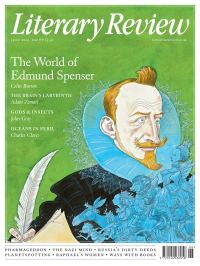Jonathan Mirsky
Interview: Yang Lian
‘The Chinese Communist Party is too stupid, cynical and ignorant to understand what is going on in deep Chinese poems. Nobody qualified to understand a real Chinese poem would ever enter the Party.’
So says Yang Lian, one of the best-known Chinese poets of the last twenty years. Born in 1955 in Bern, where his father was a diplomat, Yang grew up in China and was sent to the countryside during the Cultural Revolution for ‘education through labour’. During that time he began writing poems in the forbidden traditional genre, but after his release in 1977, having discovered more modern styles, he came into contact with the ‘Misty’ poets. A poem titled ‘Norlang’, after a Tibetan waterfall, was condemned in 1983 during the ‘anti-spiritual pollution’ campaign and he narrowly escaped arrest.
In 1989, while Yang was travelling in Australia and New Zealand, the Tiananmen uprising began; because he joined protests in Auckland he was banned from China and two volumes of his poetry were destroyed. Now an adopted citizen of New Zealand and the UK, Yang lives in exile in London. I spoke with him on 16 April, the same day the London Book Fair opened. The special guest at the fair was Beijing’s General Administration of Press and Publication (GAPP), the body of the Party that ensures that anything published is, so to say, strictly kosher. This official imprimatur meant that only thirty or so approved authors received invitations to attend the fair.
Yang has returned to China many times to see his father; he is always closely watched but, amazingly (Party stupidity again?), thirteen volumes of his poetry have been published in Shanghai, selling around 16,000 copies. Also surprising is that, after Yang received the prestigious Nonino International Literature Prize, he was

Sign Up to our newsletter
Receive free articles, highlights from the archive, news, details of prizes, and much more.@Lit_Review
Follow Literary Review on Twitter
Twitter Feed
It wasn’t until 1825 that Pepys’s diary became available for the first time. How it was eventually decrypted and published is a story of subterfuge and duplicity.
Kate Loveman tells the tale.
Kate Loveman - Publishing Pepys
Kate Loveman: Publishing Pepys
literaryreview.co.uk
Arthur Christopher Benson was a pillar of the Edwardian establishment. He was supremely well connected. As his newly published diaries reveal, he was also riotously indiscreet.
Piers Brendon compares Benson’s journals to others from the 20th century.
Piers Brendon - Land of Dopes & Tories
Piers Brendon: Land of Dopes & Tories - The Benson Diaries: Selections from the Diary of Arthur Christopher Benson by Eamon Duffy & Ronald Hyam (edd)
literaryreview.co.uk
Of the siblings Gwen and Augustus John, it is Augustus who has commanded most attention from collectors and connoisseurs.
Was he really the finer artist, asks Tanya Harrod, or is it time Gwen emerged from her brother’s shadow?
Tanya Harrod - Cut from the Same Canvas
Tanya Harrod: Cut from the Same Canvas - Artists, Siblings, Visionaries: The Lives and Loves of Gwen and Augustus John by Judith Mackrell
literaryreview.co.uk